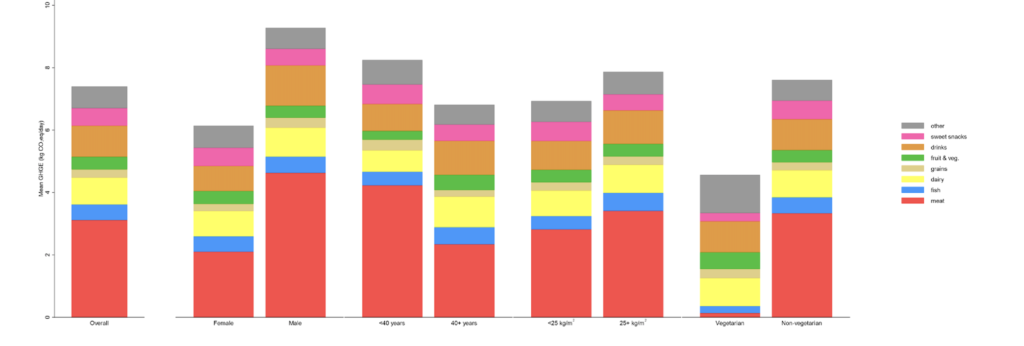Variations in greenhouse gas emissions of individual diets: Associations between the greenhouse gas emissions and nutrient intake in the United Kingdom
Research Article
Abstract
Background
Food production accounts for 30% of global greenhouse gas (GHG) emissions. Less environmentally sustainable diets, including alcohol, are also often more processed, energy-dense and nutrient-poor. To date, the environmental impact of diets have mostly been based on a limited number of broad food groups.
Objectives
The researchers link GHG emissions to over 3000 foods, including alcohol, assessing associations between individuals’ GHG emissions, their nutrient requirements and their demographic characteristics. They also identify additional information required in dietary assessment to generate more accurate environmental impact data for individual-level diets.
Methods
GHG emissions of individual foods, including process stages prior to retail, were added to the UK Composition Of Foods Integrated Dataset (COFID) composition tables and linked to automated online dietary assessment for 212 adults over three 24-hour periods. Variations in GHG emissions were explored by dietary pattern, demographic characteristics and World Health Organization Recommended Nutrient Intakes (RNIs).
Results
GHG emissions estimates were linked to 98% (n = 3233) of food items.
Meat explained 32% of diet-related GHG emissions; 15% from drinks; 14% from dairy; and 8% from cakes, biscuits and confectionery.
Non-vegetarian diets had GHG emissions 59% higher than vegetarian.
Men had 41% higher GHG emissions than women.
Individuals meeting World Health Organization Recommended Nutrient Intakes (RNIs) for saturated fats, carbohydrates and sodium had lower GHG emissions compared to those exceeding the RNI.
Discussion
Policies encouraging sustainable diets should focus on plant-based diets. Substituting tea, coffee and alcohol with more sustainable alternatives, whilst reducing less nutritious sweet snacks, presents further opportunities.
Healthier diets had lower GHG emissions, demonstrating consistency between planetary and personal health.
Further detail could be gained from incorporating brand, production methods, post-retail emissions, country of origin, and additional environmental impact indicators.
Alcohol and greenhouse gas emissions in the UK
Mean greenhouse gas emissions associated with a person’s daily diet were 7.4 kg CO2eq/day, with a geometric mean of 6.2 kg CO2eq/day (95% CI 5.8 to 6.7).
The largest overall contribution to diet-related GHG emissions came from meat (32% of total diet-related GHG emissions), with drinks (15%), dairy (14%), and cakes, biscuits & confectionery (8%) also contributing relatively high amounts.
The GHG emissions from drinks were dominated by tea, coffee and alcoholic beverages which, together with cakes, biscuits and confectionary, suggest 24% of total diet-related GHG emissions derive from largely unnecessary foods and drinks.

Fig 1. shows that drinks – including a significant contribution from alcohol – contribute major greenhouse gas emissions, across the different categories, second only to meat.
